Related Research Articles
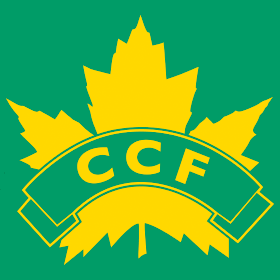
The Co-operative Commonwealth Federation was a federal democratic socialist and social-democratic political party in Canada. The CCF was founded in 1932 in Calgary, Alberta, by a number of socialist, agrarian, co-operative, and labour groups, and the League for Social Reconstruction. In 1944, the CCF formed one of the first social-democratic governments in North America when it was elected to form the provincial government in Saskatchewan.

Mitchell Frederick Hepburn was the 11th premier of Ontario, from 1934 to 1942. He was the youngest premier in Ontario history, becoming premier at age 37. He was the only Ontario Liberal Party leader in the 20th century to lead his party to two majorities.

The Ontario New Democratic Party is a social democratic political party in Ontario, Canada. The party currently forms the Official Opposition in Ontario following the 2018 general election. It is a provincial section of the federal New Democratic Party. It was formed in October 1961 from the Co-operative Commonwealth Federation and the Ontario Federation of Labour (OFL).
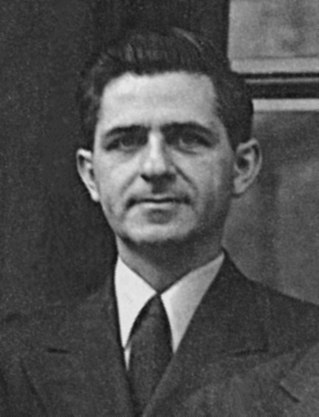
David Lewis was a Canadian labour lawyer and social democratic politician. He was national secretary of the Co-operative Commonwealth Federation (CCF) from 1936 to 1950 and one of the key architects of the New Democratic Party (NDP) in 1961. In 1962, he was elected as the Member of Parliament (MP), in the House of Commons of Canada, for the York South electoral district. While an MP, he was elected the NDP's national leader and served from 1971 until 1975. After his defeat in the 1974 federal election, he stepped down as leader and retired from politics. He spent his last years as a university professor at Carleton University, and as a travel correspondent for the Toronto Star. In retirement, he was named to the Order of Canada for his political service. After suffering from cancer for a long time, he died in Ottawa in 1981.
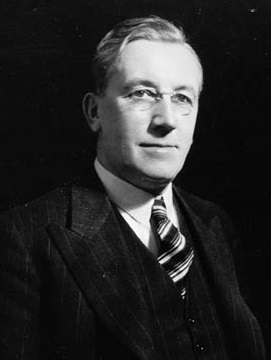
Major James William Coldwell was a Canadian democratic socialist politician, and leader of the Co-operative Commonwealth Federation (CCF) party from 1942 to 1960.
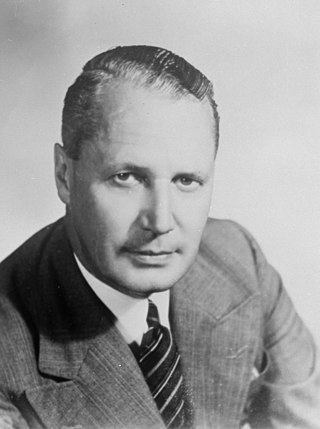
George Alexander Drew was a Canadian politician. He served as the 14th premier of Ontario from 1943 to 1948 and founded a Progressive Conservative dynasty that would last 42 years. He later served as leader of the federal Progressive Conservative Party and Leader of the Official Opposition from 1948 to 1956.

Edward Bigelow Jolliffe was a Canadian social democratic politician and lawyer from Ontario. He was the first leader of the Ontario section of the Co-operative Commonwealth Federation (CCF) and leader of the Official Opposition in the Ontario Legislature during the 1940s and 1950s. He was a Rhodes Scholar in the mid-1930s, and came back to Canada to help the CCF, after his studies were complete and being called to the bar in England and Ontario. After politics, he practised labour law in Toronto and would eventually become a labour adjudicator. In retirement, he moved to British Columbia, where he died in 1998.
Lister Sheddon Sinclair, OC was a Canadian broadcaster, playwright and polymath.
The Ontario New Democratic Party elects its leaders by secret ballot of the party members and/or their delegates at leadership elections, as did its predecessor, the Co-operative Commonwealth Federation. The party leader can be challenged for the leadership at the party's biennial convention. The Ontario New Democratic Party is a social democratic political party in Ontario, Canada.

The Co-operative Commonwealth Federation – The Farmer-Labor Party of Ontario, more commonly known as the Ontario CCF, was a democratic socialist provincial political party in Ontario that existed from 1932 to 1961. It was the provincial wing of the federal Co-operative Commonwealth Federation (CCF). The party had no leader in the beginning, and was governed by a provincial council and executive. The party's first Member of the Legislative Assembly (MLA) was elected by voters in the 1934 Ontario general election. In the 1937 general election, no CCF members were elected to the Ontario Legislature. In 1942, the party elected Toronto lawyer Ted Jolliffe as its first leader. He led the party to within a few seats of forming the government in the 1943 general election; instead, it formed the Official Opposition. In that election, the first two women were elected to the Ontario Legislature as CCFers: Agnes Macphail and Rae Luckock. The 1945 election was a setback, as the party lost most of its seats in the Legislature, including Jolliffe's seat. The party again became the Official Opposition after the 1948 general election, and defeated the Conservative premier George Drew in his seat, when Bill Temple unexpectedly won in the High Park constituency. The middle and late 1940s were the peak years for the Ontario CCF. After that time, its electoral performances were dismal, as it was reduced to a rump of two seats in the 1951 election, three seats in the 1955 election, and five seats in the 1959 election. Jolliffe stepped down as leader in 1953, and was replaced by Donald C. MacDonald.

Francis Andrew Brewin (1907–1983) was a lawyer and Canadian politician and Member of Parliament. He was the grandson of Liberal cabinet minister Andrew George Blair. His son John Brewin also served in the House of Commons of Canada.
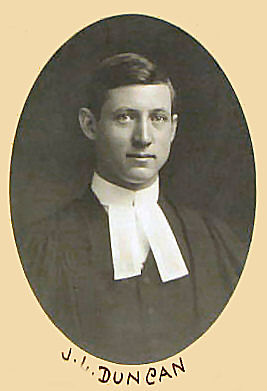
James Lewis Duncan was a Canadian politician and lawyer.

William Horace (Bill) Temple, nicknamed "Temperance Bill" or "Temperance Willie", was a Canadian socialist politician, trade union activist, businessman and temperance crusader. As a youth he worked for the railway. During World War I, and World War II he served in the Royal Naval Air Service and later on the Royal Canadian Air Force. Between the wars, he was a salesman, and then he started a clothing import business. He became a socialist during that period and joined the Co-operative Commonwealth Federation (CCF) when it was formed. He ran for political office many times for the CCF, both federally and provincially. The highlight of his political career was in 1948, when he defeated the incumbent Ontario Premier George Drew in his own legislative seat, in the electoral district of High Park, even though Drew's party won the general election with a majority government. His tenure was relatively short, serving only one term, and was defeated in the 1951 provincial election, and went back into the clothing import business. In his later years, he successfully led the political fight to maintain the prohibition on selling alcohol in a section of Toronto's west end and won three referendums in the 1960s, 1970s, and 1980s. He died in the spring of 1988, a few months before another referendum on lifting the restrictions on alcohol in the area was again defeated, his "last" victory.
The 1945 Ontario general election was held on June 4, 1945, to elect the 90 members of the 22nd Legislative Assembly of Ontario of the province of Ontario.
The 1951 Ontario general election was held on November 22, 1951, to elect the 90 members of the 24th Legislative Assembly of Ontario of the Province of Ontario.
The 1943 Ontario general election was held on August 4, 1943, to elect the 90 Members of the 21st Legislative Assembly of Ontario of the Province of Ontario.
Gerald Lewis "Gerry" Caplan is a Canadian academic, public policy analyst, commentator, and political activist. He has had a varied career in academia, as a political organizer for the New Democratic Party, in advocacy around education, broadcasting and African affairs and as a commentator in various Canadian media.
Robert Hugh Carlin was a Canadian labour union organizer and politician, who represented the electoral district of Sudbury in the Legislative Assembly of Ontario from 1943 to 1948. He was a member of the Co-operative Commonwealth Federation (CCF).
William John Grummett was a Canadian politician. He represented the electoral district of Cochrane South in the Legislative Assembly of Ontario from 1943 to 1955 as a member of the Co-operative Commonwealth Federation (CCF).
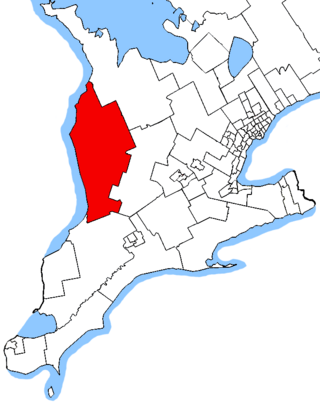
Huron—Bruce is a provincial riding in Ontario, Canada, that has been represented in the Legislative Assembly of Ontario since 1987. It was known as Huron from 1987 to 1999.
References
- 1 2 3 MacDonald, p.291-297
- ↑ Caplan (1973), p. 157
- ↑ The Canadian Press (1945-07-07). "Dempster explains report inaccuracies". The Windsor Daily Star. Windsor, Ontario. p. 12. Retrieved 2011-08-21.
- ↑ Caplan (1973), pp. 182-184,187
- 1 2 Caplan (1973), p. 168
- ↑ Caplan (1973), p. 179
- ↑ Caplan (1973), p. 170
- ↑ "Drew Orders Judicial Probe Into 'Gestapo' Charges, Which He Denies". The Globe and Mail. Toronto. 1945-05-28. p. 8.
- ↑ Special to the Star (1945-05-29). "Probe Before Voting Hepburn tells Drew". The Toronto Daily Star. Toronto. p. 4.
- ↑ Caplan (1973), pp. 170-171
- ↑ Caplan (1973), p. 191
- ↑ Caplan (1973), pp. 171-172
- 1 2 3 Globe staff (1945-06-21). "Jolliffe Protests Probe Into How He Obtained Confidential Police Data". The Globe and Mail. Toronto. p. 3.
- 1 2 Star Staff (1945-07-21). "Segwick and Jolliffe wind up probe argument". The Toronto Daily Star. Toronto. p. 26.
- ↑ Lewis (1981), p. 276
- ↑ Caplan (1973), p. 173
- 1 2 Caplan (1973), pp. 172-188
- ↑ The Canadian Press (1945-10-12). "Premier Drew and his government absolved of forming "Gestapo"". The Evening Citizen. Ottawa. p. 13. Retrieved 2011-08-21.
- ↑ Caplan (1973), pp. 181-188
- ↑ Young (1969), p. 118
- 1 2 3 4 UPC (1981-12-03). "Former Ontario premier 'knew of police spy unit'". The Montreal Gazette. Montreal. Retrieved 2011-08-21.
- ↑ MacDonald (1998), p. 295-296
- ↑ "George Drew fonds: Call# MG 32-C3" (PDF). Restricted Papers. Library and Archives Canada. 2005-01-04. Retrieved 2007-05-13. When Edward Drew (George's son) dies, these archives will become unrestricted.
- ↑ Lewis (1981), pp. 276, 287